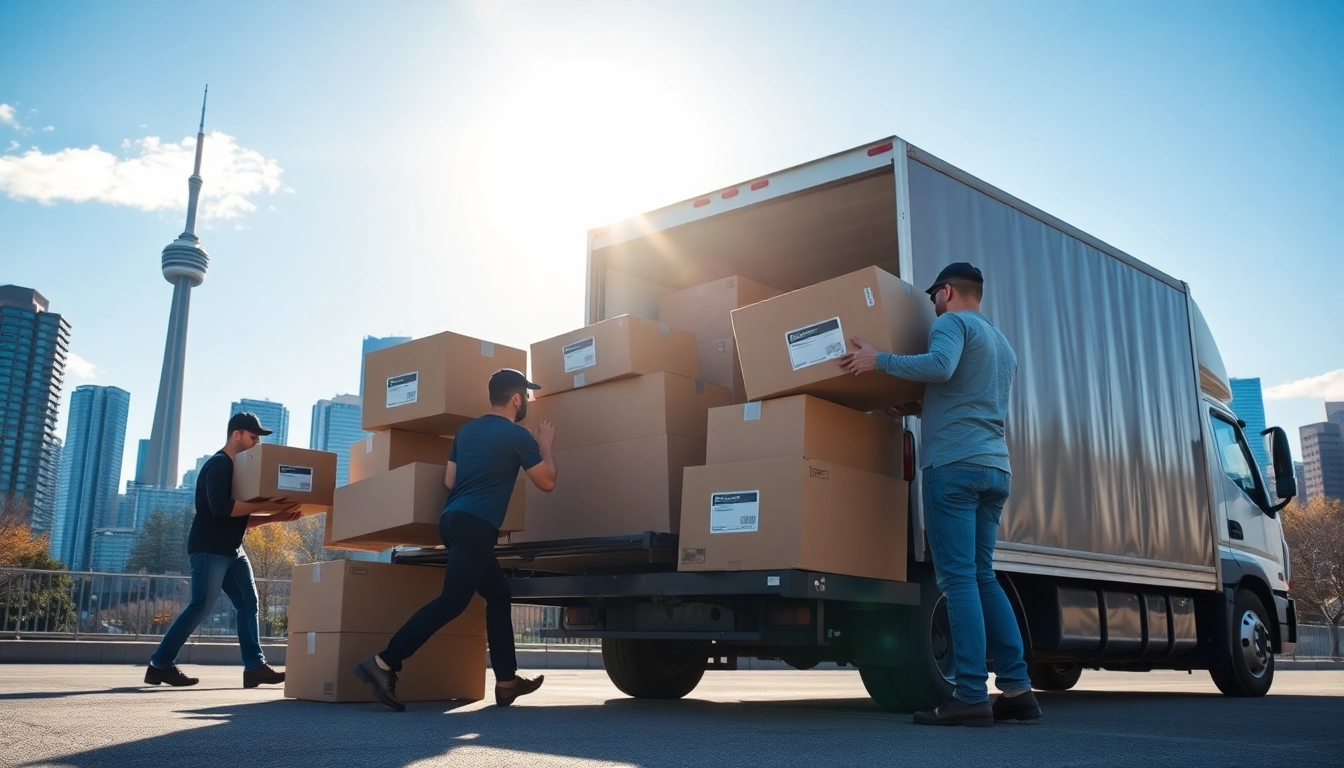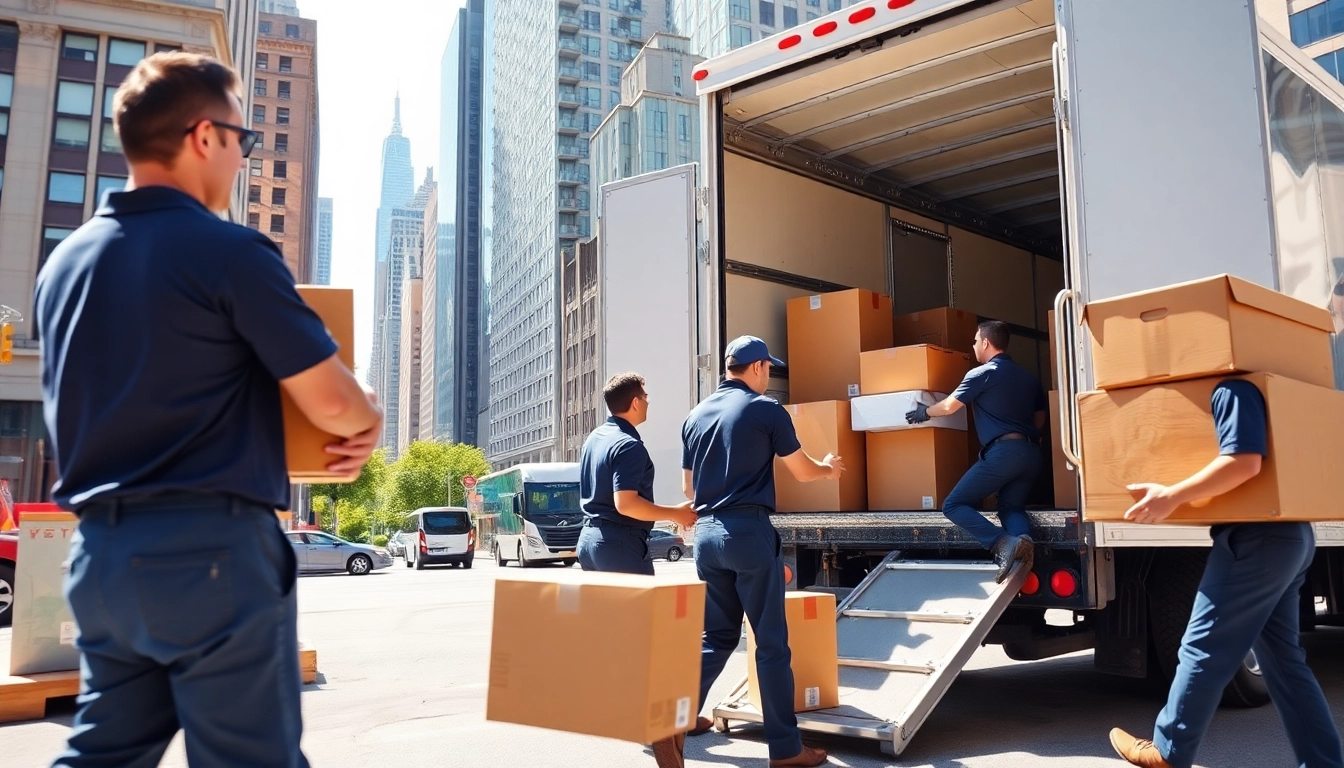Understanding Toronto Moving Services
When it comes to relocating, understanding the landscape of Toronto moving services is essential for a smooth transition. Toronto, being one of the largest and most diverse cities in Canada, offers a wide array of moving services tailored to meet various needs. Whether you are planning a residential move, an office relocation, or require specialized services, having the right information can significantly ease any stress associated with the moving process.
Types of Services Offered
Toronto’s moving services can be broadly categorized into several types, ensuring that you find exactly what fits your situation:
- Residential Moving: This includes the transportation of household items like furniture, appliances, and personal belongings from one residence to another. Local and long-distance residential moving options are available.
- Commercial Moving: Businesses often need to relocate offices or specific departments. Professional movers can assist with heavy equipment, office furniture, and sensitive documents, ensuring minimal disruption to operations.
- Packing Services: Packing can be one of the most time-consuming and labor-intensive parts of moving. Many Toronto movers offer packaging assistance, providing materials and professional packing expertise to ensure your items are secure during transport.
- Storage Solutions: Sometimes, it may not be feasible to move items directly to your new location. Moving companies in Toronto frequently provide storage facilities, allowing you to store your belongings safely for a certain period.
- Specialized Services: This can include handling delicate items (like pianos and artwork), last-minute moving assistance, or even cleaning services post-move.
What to Expect from Your Movers
Engaging with moving companies in Toronto means you can expect a professional experience tailored to your needs:
- Initial Consultations: Most reputable moving companies will offer consultations to understand your needs, assess the scope of the move, and provide personalized quotes.
- Expertise and Experience: Moving specialists typically possess valuable knowledge of local routes, regulations, and efficient moving techniques, all of which can lead to a timely and hassle-free experience.
- Insurance and Liability: Understanding the insurance options available is crucial; professional movers should offer coverage to protect your belongings during transit.
- Customer Service: Good moving companies pride themselves on exceptional customer service, from the initial inquiry to post-move follow-ups.
Evaluating Your Moving Needs
Before engaging with a moving service, assessing your needs is crucial for a successful move. Consider the following aspects:
- Volume of Items: Estimate the number of belongings you need to move to determine the size of the moving truck and crew required.
- Distance: The distance of your move—whether local or long-distance—will affect costs and logistics.
- Timing: Plan your move according to key dates, taking into account work schedules, lease timelines, and availability of movers.
- Budget: Understanding your budget helps in narrowing down the types of services you can afford and what level of service you need.
Choosing the Right Toronto Moving Services
Selecting the right mover involves careful consideration and research. This section outlines some key points to keep in mind:
Factors to Consider When Selecting Movers
Finding a trustworthy moving company is paramount for a stress-free experience:
- Recommendations and Reviews: Start with recommendations from friends or family, and check for online reviews. Platforms like Yelp and Google Reviews can provide insights into previous customer experiences.
- Licensing and Insurance: Ensure that the moving company is licensed and insured. This not only guarantees their legitimacy but also protects you in case of any unfortunate events.
- Transparent Pricing: A good moving company will provide transparent pricing with no hidden fees. Request a detailed estimate that outlines possible additional charges.
- Service Variety: Choose a mover that offers a complete range of services you may require, including packing, storage, and moving specialty items.
Reading Reviews and Testimonials
Before committing, reading reviews can help you gain perspective on a company’s reliability and efficiency:
- Pattern Recognition: Look for feedback on consistent issues or praises. A pattern in reviews regarding punctuality, care with belongings, and customer support can guide your decision.
- Detailed Testimonials: Seek out testimonials that provide detailed accounts of the entire moving process rather than just singular experiences.
- Communicate with Past Customers: If possible, reach out to previous customers to discuss their experiences to get a balanced view of the moving company.
Getting Quotes and Estimates
Once you have shortlisted your potential moving companies, the next step is obtaining quotes.
- In-home Estimates: Many companies offer free in-home estimates, where a representative will assess your items and provide a comprehensive quote.
- Comparative Analysis: Obtain at least three quotes to compare services offered against prices. Ensure you’re comparing similar services to get an accurate picture.
- Inquire about Discounts: Some moving companies may offer discounts for off-peak moving times or for booking early, so ask about any available deals.
Preparing for Your Move
Preparation is key to executing a smooth move, and it involves several proactive steps:
Essential Packing Tips for Efficient Moving
Effective packing can minimize damage and streamline your moving process:
- Declutter Before Packing: Sort through your belongings before packing. This will save time and money, as moving less helps in reducing your overall moving cost.
- Invest in Quality Packing Materials: Secure packing tape, bubble wrap, sturdy boxes, and packing paper to protect fragile items. Quality materials can be purchased from moving supply retailers.
- Label Boxes: Clearly label each box with its contents and the room it belongs to. This will significantly ease the unpacking process.
- Pack an Essentials Box: Have a separate box for essential items that you will need immediately upon arrival at your new home. This might include toiletries, clothes, basic kitchen items, etc.
Creating a Moving Timeline
Establishing a timeline helps in managing your moving process effectively:
- Map Out Key Dates: Finally, including dates for when to start packing, when to book the movers, and when to have everything completely moved out is crucial.
- Checklists: Create checklists to ensure no aspect of the move is overlooked. Include tasks like notifying utility companies, changing your address, and updating insurance information.
- Time Blocks: Allocate specific time blocks for packing different rooms to avoid getting overwhelmed as the move date approaches.
Communicating with Your Moving Team
Communication ensures that all expectations are clear between you and your moving team:
- List Special Instructions: If you have special instructions or items of considerable value, inform your movers ahead of time.
- Be Available on Moving Day: Being accessible to answer questions or provide clarification can help expedite the moving process.
- Post-Move Communication: After the move, follow up with your moving company to address any concerns or feedback you might have.
During the Move: Best Practices
The actual moving day can often be hectic, but following some best practices can alleviate stress:
What to Do on Moving Day
Being organized on moving day leads to a more effective move:
- Do a Final Walk-through: Ensure that nothing is left behind by doing a comprehensive walk-through of your old property.
- Direct the Movers: Provide clear, concise directions to the movers regarding where items should be unloaded in your new space.
- Take Inventory: Keep a checklist of items being loaded to track your belongings during transit.
Ensuring Safety and Efficiency
Safety should always come first during the moving process. Here are some quick tips:
- Protect Valuables: Ensure that valuable items like documents, jewelry, and electronics are handled with extra care, and keep them with you if feasible.
- Monitor Heavy Lifting: Keep an eye on how the movers handle heavy or fragile items to ensure everything is managed safely.
- Stay Hydrated: Make sure that everyone involved has access to water and breaks to maintain energy levels throughout the moving process.
Handling Unexpected Challenges
No move goes perfectly, so being prepared for unexpected challenges is essential:
- Adaptability: Be prepared to adapt to unexpected scenarios, like delays or issues with finalizing your new residence. Flexibility is key.
- Communication is Critical: Keep an open line of communication with your moving team to address concerns quickly.
- Contingency Plans: Have a backup plan for potential complications, such as alternative storage options or additional moving dates if necessary.
Post-Move Considerations
Completing your move is just the beginning! After settling into your new space, take time to focus on these critical aspects:
Unpacking and Settling In
The unpacking phase can be both exciting and overwhelming. Here are some tips to ease this process:
- Prioritize Rooms: Unpack essential rooms like the kitchen and bedrooms first, followed by common areas. This will help you establish a functional living space quickly.
- Utilize Storage Solutions: If your new space lacks storage, consider utilizing under-bed storage or buying furniture with storage capabilities.
- Take Your Time: Don’t feel rushed to get everything in place immediately; allow yourself time to settle and organize at a natural pace.
Follow-ups with Moving Companies
After your move, it’s important to maintain contact with the moving company:
- Check for Damages: Report any damages or issues promptly to ensure claims can be processed effectively.
- Provide Feedback: Consider leaving feedback based on your experience. This helps improve services for future customers.
- Update Any Changes: If your needs change, keep the lines of communication open with the moving company for future services.
Feedback and Reviews for Your Movers
Your feedback is valuable not only for the company but also for future customers:
- Share Your Experience: Whether positive or negative, your experience can guide others in finding reliable moving services.
- Social Media Reviews: Utilize social media platforms to share your story and help develop community knowledge regarding local moving services.
- Be Constructive: When providing feedback, be constructive to help improve the company’s services.



